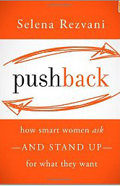Tips for women bankers on the move
(Psst...Men could learn from it too!)
- |
- Written by Jane Haskin
- |
- Comments: DISQUS_COMMENTS

Pushback: How Smart Women Ask—AND STAND UP—For What They Want. By Selena Rezvani. Jossey-Bass, an imprint of Wiley. 208 pp.
By Jane Haskin, president & CEO, First Bethany Bank, Okla. Jane Haskin is a frequent reviewer for Banking Exchange.
Have you ever felt that you don't get what you need or deserve on the job?
From the moment I saw this book, I was intrigued by the title Pushback.
I must admit when I think of "pushback," my first thought is backing away from a situation and when thinking in terms of negotiations it resonates a negative tone of resistance rather than a positive tone of advocacy.
Author Selena Rezvani states at the very beginning of the book that her definition of "pushback" is used very broadly and in a more positive way to advance a cause, make a request, and persuade others to the merits of our view.
 |
Armed with Rezvani's definition of pushback, you can delve into her suggestions to help you become a better negotiator. She reinforces her ideas through the actual experiences of women who are top executives in their respective fields.
Tackling an uncomfortable subject for business women
In their everyday lives, women are constantly negotiating with children, spouses, retailers, service providers, and others.
However, when it comes to negotiating in their professional lives, women tend to become much more passive in their negotiations than men.
Linda Babcock and Sara Laschever of Carnegie Mellon University discovered in their research that women most often used negative metaphors such as "going to the dentist" to describe how they felt when negotiating. Men, on the other hand, used positive metaphors such as "a ballgame" or "a wrestling match" to describe negotiating.
Why are women so fearful of negotiating?
Research shows that in self-assessments, men tend to overestimate their abilities and women commonly underestimate theirs.
Women often feel they must achieve perfection and need ALL of the answers before they take the risk of entering a negotiation, according to Rezvani. And yet the stakes of playing things that way are high: The author reports that it is estimated that a woman stands to lose more than $1,000,000 over the course of her life when compared to a man, if she omits negotiating from her salary discussions.
Women make up more than half of the U.S. labor force, yet represent a meager portion of senior leaders in government, business, and even in the fields that are female-dominated, such as banking. Could better negotiating skills be the lever of change that will catapult more women into these leadership roles?
Finding your inner bargainer
To become a better negotiator, you must find your own style, one that allows you to become as comfortable as possible during negotiations. The author provides a series of self-assessments to help the reader discover your personal strengths and weaknesses. The reader is also challenged to become more aware of everyday situations where she can begin to practice negotiation skills that will empower her to be ready for those important discussions where there is much more at stake.
What can women do to overcome their fear of negotiating in the business arena?
The author devotes much of her book to the development of negotiating skills, along these lines:
Prepare psychologically. Emotion is going to be part of any negotiation. The secret is to learn to channel your emotions in a positive way, rather than trying to merely control your emotions.
Being well prepared with facts can help you positively focus your emotions and give you more confidence. If you are negotiating an increase in your salary, you may want to prepare yourself with salary statistics for similar jobs within your industry, suggests Rezvani.
In my experience, the internet has made this type of information more readily available than it was in the past. State banking associations can also be helpful in providing salary equivalents for like jobs in your area.
One important point regarding salary negotiations that Rezvani makes: If you don't negotiate for your salary, your employers will walk away happy that they paid you less--but may also wonder why they hired you.
Gain confidence by acknowledging the amount of your own personal power that you can take to the negotiation because of your experience, education, book of business, or other attributes that make you valuable to your organization.
Women are often hesitant to mention their own accolades because they fear it may appear to be bragging or aggressive. Rezvani provides several helpful suggestions for incorporating successful performance into negotiations without appearing to be self-promoting. "If it's true," she insists, "it's not bragging."
I found that one of Rezvani's best points was to find ways that all parties can benefit in a negotiation. She suggests it is highly probable you will get what you ask for if everyone walks away a winner.
Do your homework. Before you enter into any negotiation, make sure you are prepared.
There are six steps provided to help you prepare.
1. "Gather the tangibles." This includes arming yourself with facts, as discussed above, but it includes finding as much information as you can about your counterpart in the negotiation and may include asking co-workers about their experiences.
2. "Get in their heads." Once you have all of the tangibles gathered, take a step back and try to imagine the negotiation from the perspective of the other person. What opposition might they have to your proposal? By thinking through both sides of the conversation, you can be equipped with prepared responses to possible objections.
3. "Enlist your network." If there is a group or a team involved, begin talking to other team members individually before the meeting to see if they will support your position. One way to gain influence with a busy group is to provide them with a written draft of your proposal. This technique could be used if you are proposing a new product.
4. "Choose strategies and a style." Rezvani warns against "one-dimensional" negotiating, where both sides basically disagree and just keep hammering the same points home over and over again. She warns that not picking and choosing among approaches prevents negotiators from finding a mutually beneficial compromise.
5. "Prepare to tell the story." It also helps negotiations if you can summarize all the information you have gathered and turn it into a compelling narrative. Rezvani points out that Peter Guber, the author of Tell to Win, believes if you move your listeners' hearts that their feet and wallets will follow.
6. "Nail down the logistics." Frequently, negotiators neglect the physical details of bargaining, the author warns. How you dress is one point--she writes of a women executive who chooses her "warrior suits" on days when she is expecting a difficult meeting. She even wears lower heels, so she feels steadier on her feet. Another important detail to consider is the time of day for the discussion. Don't ignore location, either.
Maneuvering through the conversation. Once you have done all of your homework it is important you practice what you want to say.
I can remember the first time I went out on a sales call by myself, as a junior loan officer.
I sat in the parking lot of the potential customer for about 20 minutes practicing the conversation before I could work up enough courage to go into the building. I was armed with a pamphlet explaining every possible product the bank had to offer.
Once in the prospect's office, I noticed he had football memorabilia all over the office. Even though I didn't know much about football, all I had to do was mention he had an impressive football collection. After he told me about each item, we began talking about how our bank could help his business. The whole process was much easier than I had anticipated and to this day, I enjoy calling on new prospects.
If you aren't sure how you come across to others, it is a powerful tool to make a video of yourself in a negotiation. This will help you see for yourself if you need additional work on your presentation skills. Rezvani describes her own experience, viewed when she was working with an executive coach:
"Although the coach ultimately gave me helpful feedback, nothing could substitute for the powerful learning I got from seeing myself presenting on camera. In watching myself on film, I noticed that in my zeal to be professional and not--horror of horrors--come across as too young, I was stiffening my body and deadening my emotions at various points in my speech. Given my huge enthusiasm for my topic, ‘no emotion' was the last message I ever wanted to convey."
If your meeting is of high importance, recruit family and friends to role-play as your counterpart. By doing this, they can offer helpful suggestions on ways you can improve your delivery. It also helps to visualize yourself successfully presenting your proposal.
And sometimes saying nothing is the best strategy. Rezvani advises that silence is an often forgotten powerful skill and one you can practice as you go through your everyday routine. Most people are so uncomfortable with silence in a conversation they will keep talking to fill the void. This can be used to your advantage while negotiating.
It does take awareness. You need to be sensitive to the body language you project when you are trying to make a point. If you have your arms crossed and a scowl on your face while listening to the other party, it is going to be difficult for them to feel you want to negotiate. They will more likely feel your proposal is the only one you wish to be considered and you are closed to any other ideas.
Follow Up. Once you have been successful at negotiating what you want, don't forget to follow it up in writing to make sure all parties understand the same terms. Another recommendation from Rezvani is to sit down after a negotiation and perform a self-evaluation as to what parts went well and where you may need to improve.
Important: If your proposal is turned down, don't hear that as an absolute "no" but as a "not yet."
And if the answer is "no," be gracious and thank your audience for the opportunity to meet with them.
Even though this book is targeted at helping women improve their negotiation skills, actually everyone can benefit from the lessons learned. The good news is your negotiation skills will get better the more you practice and put them to use!
If you'd like to review or recommend recent books for our online book column, please e-mail [email protected]
Want more banking news and analysis?
Get banking news, insights and solutions delivered to your inbox each week.
Tagged under Human Resources,














